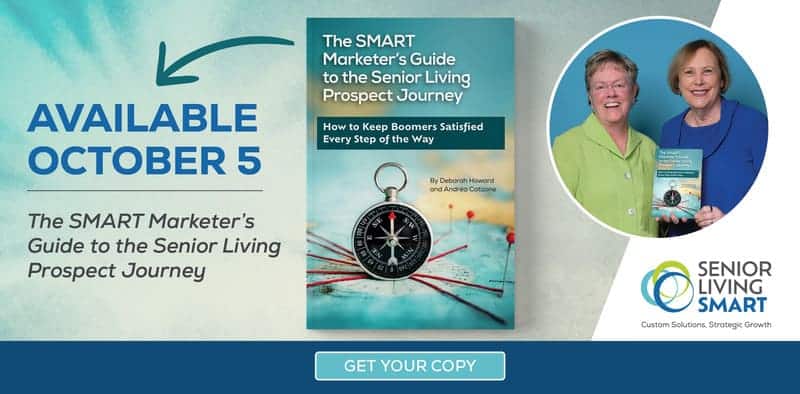Memory Care Lead Generation: How It’s Different
We asked our CEO, Debbie Howard, to discuss an important topic: memory care lead generation.
Below, she answers the following questions:
- How does memory care lead generation differ from lead gen for assisted living or independent living?
- Who are the buyer personas?
- What kind of messaging resonates with memory care leads?
- Are specific marketing channels are particularly effective for generating memory care leads?
- How important is local community outreach in memory care lead generation?
- Do you recommend marketing to potential referral sources?
- Any final thoughts that you want to communicate about memory care lead generation?
How does memory care lead generation differ from lead gen for assisted living or independent living?
Debbie Howard: There’s a greater sense of urgency with memory care leads. An interesting study came out during the pandemic that showed how Covid affected the sales cycle for different levels of care. The only sales cycle that wasn’t affected was memory care. It was the shortest sales cycle then, and it remains the shortest sale cycle today, which makes sense since it isn’t something most people plan for or are proactive about. Even though the disease is very predictable, people still don’t want to deal with it until they absolutely must.
People looking for independent living and assisted living don’t typically feel the same pressures. Most of those folks are being proactive. People looking for memory care are often in crisis mode.
Who are the personas in memory care lead gen? What do we need to know about them?
Debbie Howard: The buyer personas include the adult child and the spouse. The adult child tends to take a more intellectual approach initially. They try to quickly learn as much as possible because they want to make informed decisions. But the emotional aspect does enter into the equation eventually. After all, this is their parent, and the adult child is entrusting their mother or father to strangers. Moving a loved one into memory care is never easy, even if it’s the right decision.
For the spouse, the trajectory tends to be the opposite. They start off needing trust first and education second. Many spouses have resisted moving their loved one into memory care for so long. They made a vow to care for their partner for better or worse. Moving their partner to memory care often fills them with guilt, angst, and regret.
It’s important to remind the spouse that it takes an entire staff working round the clock to care for and manage people through this disease process. Eventually, it becomes impossible for one person to do it alone—even with outside help.
What kind of messaging resonates with memory care leads?
Debbie Howard: The emotional aspect is vital to both personas. Too often, communities focus only on providing education. If you only connect with people rationally—like ‘Here are 10 Things to Look for in Memory Care’—it will take longer to connect emotionally with the prospects. And you might lose out to a community that does focus on connecting on an emotional level.
Connecting emotionally means acknowledging the not-so-pleasant parts of this disease process. This can be extremely hard for marketers since many believe all marketing must have a positive spin.
But it can be extremely powerful for a salesperson to hold a prospect’s hand and sincerely say, “I know this is killing you. I know this is the hardest decision you’ve ever made. You’ve done so much, and you’re exhausted. I’m so sorry you’re in this position.”
You don’t have to stay negative. Acknowledge how challenging the situation is. But also recognize and honor what they’ve done for their loved one—how they’ve gone the distance. There comes a point when the person with dementia can no longer safely be managed in the home, and their own quality of life is greatly diminished. When the person moves into memory care, they receive round-the-clock care from a full-time staff, which allows the spouse to return to the role of a spouse rather than a caregiver. The spouse can come in and have a date night with their loved one. They can visit daily. They can stay overnight. Showing the spouse what can be—and that there are some bright spots—can be a way to find a more positive angle.
You shouldn’t ignore the negatives just because they’re hard to discuss, though. Empathetic marketing is extremely important in senior living, especially with memory care leads.
The same is true for adult children: They’ve often missed days and weeks of work, given up vacations, and missed important events in their own life as they’ve juggled their parents’ care, so acknowledging their sacrifices is also essential.
Meet them at the emotional level—acknowledge how hard this decision is and recognize and honor all they’ve done. Then, turn it around by showing them how your community’s memory care neighborhood helps each resident succeed.
Are specific marketing channels or tactics particularly effective for generating memory care leads?
Debbie Howard: People searching for memory care are doing just that—they are actively searching.
- Use paid advertising. Paid ads, like Google Ads, hold the prime real estate on the search results pages, but keep in mind memory care is highly competitive. Regarding cost per lead, the lower end of memory care is about $100 to $120. The higher end of memory care can be as high as $400 or more.
- Make sure your website is optimized for relevant keywords. You want to ensure your senior living website is optimized for organic search. Dedicate a section to memory care, and optimize each page for memory care phrases people are searching on. Make sure you include your locations.
- Pay attention to reviews. Make sure you’ve claimed your Google Business Profile, which serves as a mini website for your community. Monitor reviews. Respond to reviews as needed. You should also claim listings on other popular review sites.
- Have a plan for responding to third-party leads. Remember, third-party leads are shared leads. You must be able to respond quickly to memory care leads from lead aggregators or else you risk another community converting the lead into a resident. This is especially true for memory care since the need is often urgent, and people are in crisis mode.
How important is local community outreach in memory care lead generation?
Debbie Howard: It’s definitely important because word of mouth is one of the best forms of marketing. Tap into skilled nursing facilities, rehab centers and hospitals. Target their social workers, case managers, care managers, and discharge planners. ERs are also good places to ensure the staff is aware of your memory care community because they often see folks from unsafe environments.
Home care agencies can manage the disease process from the early through middle stages, but when it gets to a later stage, they can’t safely manage that client anymore. So you should also focus on networking with people who run home care agencies.
Consider area agencies on aging. Even the local fire department can be a good resource. Many fire departments keep a list of homebound at-risk older adults that they often help. Reaching out and educating them about your community is also a good idea.
Do you recommend marketing to these groups and other potential referral sources?
Debbie Howard: Yes. You should have a marketing program for your referral network so that your community remains top of mind.
Make sure your referral sources have . . .
- Current brochures about your community, specifically memory care
- Business cards for relevant salespeople
- Info about upcoming events—lunch and learns, support groups and open houses
Remember, you want to make their lives easier.
- Offer to speak at their events for free.
- Create turnkey programs about popular topics that you can deliver to churches, support groups, etc.
- Sponsor their walks and other events (like Alzheimer’s walks).
- Position yourself as a go-to resource regarding memory care support/services.
What final thoughts would you like to communicate about memory care lead generation?
Debbie Howard: Remember, marketing can’t solve an operational issue. Before worrying about getting quality memory care leads, make sure you have a quality memory care program.
Suppose there’s a video circulating of a staff member abusing a resident. In that case, the best marketing in the world can’t help because the problem has to do with operations, not marketing or sales. But a high-quality memory care program with happy residents and positive results, can almost speak for itself.
Bottom line: The best way to generate leads is to have a great memory care program.





